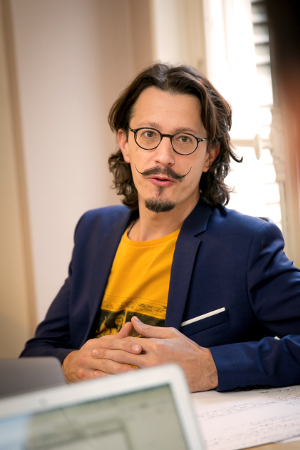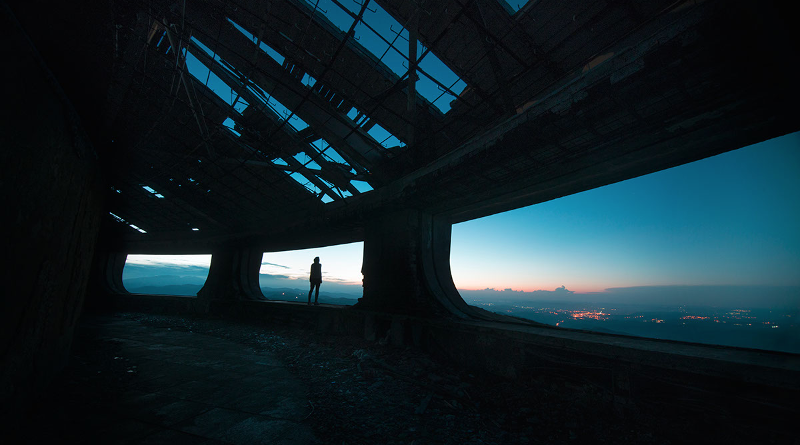Albert Meige is the CEO of Presans and the Director of the EMBA Telecom School of Management. His entrepreneurial experience in the field of industrial innovation led him to formulate a bold vision of the evolution of the organization of work. According to him, the stakes are no longer open innovation, but the open organization.
Q: Can you tell us about the path that led you to become the person you are today, CEO / Enchanter at Presans and Director of an EMBA program?
AM: First of all Jacques, let me tell you that I was not too excited about your proposal to interview me. On the one hand, despite the fact that I do a lot of public speaking, when I’m on stage, I put on my mask. Today, you ask me to remove it. To talk about me. It’s an exercise that makes me very uncomfortable. On the other hand, I’m still not convinced that it will interest anyone except my parents :-). Well, let’s go!
There are three ways to tell the story: first of all, my 15 years working as an innovator, from different positions and perspectives: first upstream, in basic and applied research in the field of plasma physics. Then, at the end of 2008, as part of an entrepreneurial adventure, Presans. And finally, through the projects carried out for our clients, I have also integrated the point of view of the large industrial groups.

The third facet that explains my career is my impertinent self-taught side, unappreciated by my teachers. I have always followed my instinct, I believe it is also a path to excellence. But, at a certain point, I could not bring myself to learn the things that bored me. Hence, also, my quest for diplomas and excellence, to compensate for the anxiety, even the metaphysical doubt that my temper often causes me! I work a lot by following my passions, which are often distant from each other, but which I will irresistibly seek to connect. My oldest passion is magic, long reserved for a milieu into which it is necessary to be initiated, and with which I keep friendships: Gerard Majax, Arturo Brachetti, Rémi Larrousse, etc. I also borrow from my first entrepreneurial adventure, and the conviction that it is the people who count in a field who have the most complete vision, the most “meta.” Then comes my passion for the underground, again a domain once reserved for a small world of initiates — a reality that the digital disruption did not fail to shake up. And here too, I invested myself with passion, which led me to meet people who knew things, who had been circulating underground for decades: people we have already talked about on this blog, elsewhere, like Xavier Niel (who does not hide it), or Gilles Thomas. These passions are connected: magic is the art of surprising, marveling, enchanting, it is a key for the business world. The underground reveals our passion for exploring new territories, which are sometimes just the opposite of territories that we falsely believe we know .
I have long wondered why I did not fit in the usual boxes. Or why from kindergarten on my teachers found me “disconcerting” or “strange.” I came to understand that this was related to my introverted and curious nature. I think I’m one of those multipotential people — those people who have had the impression that they don’t fit into any boxes since they were little. And so I think it’s not by accident that I ended up working in innovation, where the task is to see links that most people do not see. This is the positive part; there are also disadvantages.
As for the EMBA, it is a project that on the thematic level largely converges with what I already do in Presans: a happy opportunity that I get to experience as something great.M
Q: How do you reconcile so many activities?
AM: I am sometimes told that life is more than work. But for me my work is not a parenthesis, it is really a project of construction or permanent development that contributes greatly to my energy. I want to understand the world and have an impact on it. Of course, I work a lot — probably 60 hours a week, but that does not prevent taking very dispersed breaks … Holidays are a way to get tired differently, to change the ideas by varying our activity. So, how do I go about things? I can only talk about what works for me: the organization. The computer revolution has been a blessing for me. I have an inexorable need to structure, structure, structure … visible disorder is a source of anxiety, because it refers to the part of disorder that is in me! And finally, I’m not alone. One of my keys is to find people who are smarter than I am and work with them. They are the ones who make my ideas intelligible.
Q: What is the central message you want to convey about innovation?
The field of innovation imperatively demands that we have a vision of “meta” things, that we do not stick with the idea of innovation. We must understand that what is decisive is not to see things in terms of open innovation, because the issue is open organizations. Open innovation is dead, long live open organizations. All of the evolutionary processes that I have captured in my book come from deep causes whose consequences in fact go much further than the question of bringing innovative products to the market. So my main message is that we are at the dawn of a new form of organization.
Q: What is your vision for Presans today?
The vision is this: for 15 years, a series of violent and rapid disruptions have been shaking up all value chains, leading to the emergence of new forms of organization with flattened hierarchies, a model that first appeared in digital startups. What characterizes these structures is the reduction by a factor of two or three of the hierarchical layers compared to traditional companies, and fundamentally, the ability to mobilize internal and external talents, on demand. And so established businesses are now looking to incorporate these features. It’s a question of competitive survival. At the heart of the new dominant form of organization, there is, in reality, the notion of staff on demand. The key organizational ability is to be able to create teams of talents on demand. And Presans’ vision is to make our customers able to do just that. This is our reason for being, our answer to the question of why? (Simon Sinek) The new organizations have another common point: they all have a “massive transformative purpose” (MTP) that does not describe what they do, but rather provides the big reason that federates both internal and external collaborators. This is an ultra-important dimension when it comes to bonding internal and external talent together. And so, at Presans, we will do things that fit into this vision.
Q: Who are your heroes?
My heroes are in two camps. On the one hand, atypical entrepreneurs, the self-taught: Xavier Niel, Henri Seydoux, Elon Musk. Not very original, but true, since they inspire me. Steve Jobs, of course. On the other side, artists, writers. The irreplaceable Michael Jackson: do we imagine Michael Jackson in sweatpants buying his bread? No. He was a star like we no longer see. And the irreplaceable Michel Houellebecq: someone inspiring, whom we will have to talk about again in this blog.


